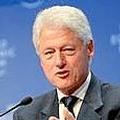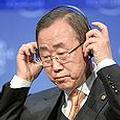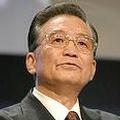 「氣候變遷正威脅我們所有的發展目標和社會進程」聯合國秘書長潘基文於1月29日在達沃斯世界經濟論壇的年度會議上,向全球企業及政府領導人表示說。「在另一方面,它也向我們展現一個絕佳的機會。」
「氣候變遷正威脅我們所有的發展目標和社會進程」聯合國秘書長潘基文於1月29日在達沃斯世界經濟論壇的年度會議上,向全球企業及政府領導人表示說。「在另一方面,它也向我們展現一個絕佳的機會。」
潘基文的看法來自於世界經濟論壇發布的一份報告。該報告指出,除非自現在起到2030年止,每年投入至少5,150億美元於潔淨能源發展,否則碳排放量將到達科學家認為無法支撐的水準,導致全球溫度升高攝氏2度。
「環保投資︰邁向一個潔淨能源的基礎設施」訂定8種對於潔淨能源基礎建設未來發展具規模的新興潔淨能源部門──岸上風力、近海風力、太陽光電、太陽熱能發電、市區太陽能垃圾焚化發電、糖基酒精燃料、纖維質及下一代生質燃料,和地熱能。
潘基文極力主張這些地位顯赫的與會者能利用當前經濟危機提出全球環保新政以創造工作機會,並藉由對可再生能源和科技發展的投資,來對抗氣候變遷。
「藉由正面著手處理氣候變遷,我們能解決現今大多數的問題,包括全球衰退的威脅。我們站在一個十字路口。我們意識我們有選擇的機會。我們能像往常一樣選擇短視近利的單向政策,或者抓住這一規模前所未見的全球合作和夥伴關係。」潘基文說。
在達沃斯舉行的另一議程,潘基文一再強烈主張針對氣候變遷進行溝通,以解釋、教育,並要求全球各國的合作保證,使預定12月在哥本哈根舉行的聯合國氣候變遷會議可以圓滿達成任務。該會議預計將就京都議定書終止後的替代協議達成結論。
 美國前總統柯林頓1月29日要求美國即刻領導,遏止當前金融危機、重新恢復全球經濟,並預言從政府對於替代能源技術的刺激經濟投資中,將可預見「工作機會爆炸性成長」。
美國前總統柯林頓1月29日要求美國即刻領導,遏止當前金融危機、重新恢復全球經濟,並預言從政府對於替代能源技術的刺激經濟投資中,將可預見「工作機會爆炸性成長」。
柯林頓強調,世界經濟的相互依存性正提醒各國政府,當他們投資美國國庫券和證券協助美國復甦時,他們也是在投資自己的出口經濟。
「金融危機證明,全球依存性比其它任何事情更重要。我們不能逃避,離婚不是選項。」柯林頓說。
中國總理溫家寶1月28日說,面對金融危機時,其政府在今後兩年將增加政府支出,並執行結構性減稅措施。「政府投資主要在政府補貼的房屋建築工程、鄉村居民的幸福工程、鐵路建設和其他基礎工程、環保工程,和震後復原與重建工程。」溫家寶說。
俄羅斯總理普丁1月28日在論壇表示,彼此信任將使各國渡過當前危機。「達成信任是我們全體必須解決的關鍵任務。信任和團結將協助我們克服困難,避免許多突發狀況,並在21世紀達成繁榮和福利。」
 在1月28日年度會議開幕式中,世界經濟論壇創始人和執行主席施瓦布(Klaus Schwab)說,「我們正經歷一個新時代的誕生,警醒我們徹底檢查我們的機構、系統、思想,和行動,並調整我們的態度和價值觀,以適應符合世界需要我們承擔更多的責任需求。
在1月28日年度會議開幕式中,世界經濟論壇創始人和執行主席施瓦布(Klaus Schwab)說,「我們正經歷一個新時代的誕生,警醒我們徹底檢查我們的機構、系統、思想,和行動,並調整我們的態度和價值觀,以適應符合世界需要我們承擔更多的責任需求。
施瓦布說,該論壇將提出一份在1月稍早發布的報告,該報告勾勒出36種危機,其中多數與自然資源和氣候問題相關。
該報告警告人們對於與自然資源相關的危機的忽視。當世界領袖聚焦在水資源可得性,該報告顯示水在能源產生過程的關鍵地位。在水資源供給的成本中,約有百分之50與能源有關。
該報告也警告已發展和發展中國家對於氣候變遷政策主張差異所造成的潛在緊張關係。
 該風險報告以正面註腳作結,說明2009年將成為最佳時點,加強全球治理及建立政治意志來恢復全球金融穩定,並且集中在管理稀有資源和氣候變遷的長期挑戰上。
該風險報告以正面註腳作結,說明2009年將成為最佳時點,加強全球治理及建立政治意志來恢復全球金融穩定,並且集中在管理稀有資源和氣候變遷的長期挑戰上。
潘基文說「今日,由於經濟衰退和氣候變遷,企業面臨從未有過的高風險環境。但對於有願景的企業,報酬將會相對很高。綠色經濟低碳和能源效率──將會創造工作機會,對永續發展技術的投資將把今日的危機變成明天的永續成長。」
"Climate change threatens all our goals for development and social progress," UN Secretary-General Ban Ki-moon told the world's business and government leaders today at the annual meeting of the World Economic Forum in Davos. "On the other hand, it also presents us with a gilt-edged opportunity."
Ban's comments came as the World Economic Forum released a report warning that unless at least US$515 billion a year is invested in clean energy between now and 2030, carbon emissions will reach a level considered unsustainable by scientists, causing global temperatures to rise by two degrees Celsius.
"Green Investing: Towards a Clean Energy Infrastructure" identifies eight emerging, large-scale clean energy sectors critical to the clean energy infrastructure of the future - onshore wind, offshore wind, solar photovoltaic, solar thermal electricity generation, municipal solar waste-to-energy, sugar-based ethanol, cellulosic and next generation biofuels, and geothermal power.
Ban urged the high-powered audience to use the current economic crisis to launch a global Green New Deal that creates jobs and fights climate change by investing in renewable energy and technological development.
"By tackling climate change head-on we can solve many of our current troubles, including the threat of global recession," said Secretary-General Ban. "We stand at a crossroads. It is important that we realize we have a choice. We can choose short-sighted unilateralism and business as usual. Or we can grasp global cooperation and partnership on a scale never before seen."
At another session in Davos, Ban pushed for a climate change communication initiative that will explain, educate and ask for global engagement, leading to success at the UN climate change conference slated to be held in December in Copenhagen, where negotiations on a successor pact to the Kyoto Protocol are slated to conclude.
Former U.S. President Bill Clinton today called for urgent U.S. leadership to stem the current financial crisis and restore the global economy and predicted an "explosion of jobs" from government stimulus-fueled investments in alternative energy technologies.
Clinton stressed the interdependence in the world economy, reminding governments that when they finance the U.S. recovery by buying U.S. Treasury bonds and securities they are investing in their own export economies.
"This financial crisis proves, as nothing else should - or could, the fundamental fact that global interdependence is more important than anything else in the world today," Clinton said. "We cannot escape each other. Divorce is not an option."
Chinese Premier Wen Jiabao Wednesday said that to meet the financial crisis, his government will increase spending and implement a structural tax cut over the next two years. "The investment will mainly go to government-subsidized housing projects, projects concerning the well-being of rural residents, railway construction and other infrastructural projects, environmental protection projects and post-earthquake recovery and reconstruction," said Wen.
Russian Prime Minister Vladimir Putin told the forum Wednesday that trust in one another will pull nations through the current crisis. "Attaining mutual trust is a key task that we all have to solve. It is trust and solidarity that will help us overcome present difficulties, avoid many shocks and achieve prosperity and welfare in the 21st century."
Opening the annual meeting on Wednesday, Klaus Schwab founder and executive chairman of the World Economic Forum said, "What we are experiencing is the birth of a new era, a wake-up call to overhaul our institutions, our systems and, above all, our thinking and our actions, and to adjust our attitudes and values to the needs of a world which rightly requires a much greater degree of responsibility and accountability."
Schwab said the forum will address the 36 risks outlined in a pre-forum report released earlier this month, many of which deal with natural resource and climate issues.
The report cautions against ignoring interconnected risks related to natural resources. As world leaders focus on water availability, the report shows that water is critical to generating energy, with 50 percent of the cost associated with water supply related to energy.
It also warns of potential rising tensions between developed and developing countries with respect to climate change policy.
The risk report concludes on a positive note, stating that 2009 could prove to be an opportune moment to strengthen global governance and build the political will to restore global financial stability, and focus on the longer term challenges of managing scarce resources and climate change.
"Today with the economic downturn and climate change, the stakes for companies have never been higher. But for businesses with vision, the rewards are equally high," said Secretary-General Ban. "The green economy is low-carbon and energy-efficient. It creates jobs. Investment in sustainable technologies will turn today's crisis into tomorrow's sustainable growth."


